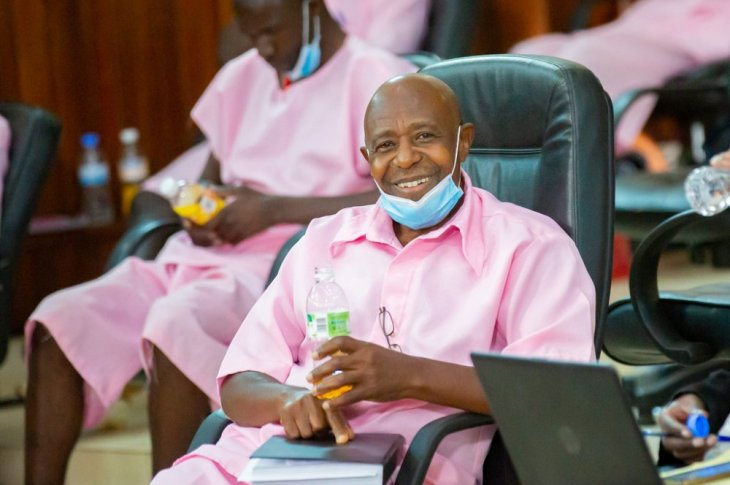Regional
Rusesabagina gets food, medicine like other inmates: RCS

The Rwanda Correctional Service (RCS) has clarified that it serves all inmates equally and works to accommodate inmates with specialized needs.
It was not a surprise to see yet another unfounded claim leveled
against the Rwandan government on the alleged mistreatment of detained terror
mastermind and former hotelier, Paul
Rusesabagina, recently published in the New York
Times.
The alarming headline “Hotel
Rwanda’ Dissident Denied Food and Medicine in Prison, Family Says” by Abdi
Latif Dahir, is a continuation of a campaign of lies and deceit orchestrated by
Rusesabagina’s family. It is coordinated by his PR machine led by Kitty Kurth,
spokesperson of the Paul Rusesabagina Hotel Rwanda Foundation (PRHRF), based in
Chicago, Illinois, as well as a web of international lawyers.
It should be made clear that Rusesabagina is not a
“dissident”. He is a man accused of serious crimes of sponsoring acts of
terrorism that claimed many lives in Rwanda and caused property damage. Being a
Hollywood hero does not wash away those crimes. Why does his family and his PR
machine keep telling such baseless lies? Their goal is to raise alarm to claim
that their man is risking death to evoke sympathy from the international
community. By doing so, they hope that pressure can be put on the Rwandan
government to free him. I doubt this strategy is going to work.
Not long ago, Rusesabagina’s
family claimed, without any
evidence, that he was held incommunicado, bound hand and foot, unable to
breathe, and held in what was described as a "slaughterhouse”. These
fabrications were rejected by the Rwanda Investigation Bureau (RIB).
Nevertheless, Rusesabagina’s family and their PR machine used this blatant
fabricated lie to send letters to the US Congress and to the UN Special
Rapporteur on torture in Geneva.
It was not a surprise to see that such an outrageous
allegation received attention and published by the NewYork Times straight from
Kurth’s press release without any simple investigation. What is evident is that there is apparent
coordination between Rusesabagina’s PR machine and the global north media which
labels Rusesabagina as “a dissident” instead of what he is: “a sponsor of terrorism”
against Rwanda, as proven by ongoing trial of him and 20 co-accused. Regarding
the allegations in The New York Times, the Rwanda Correctional Service (RCS)
clarified that it "serves all inmates equally" and works to
accommodate inmates with specialized needs.
The RCS noted that: "In the case of Rusesabagina, a
private room and separate menu were availed when he was transferred to
Nyarugenge Prison.” As noted, Rusesabagina was recently placed in a shared room
with several inmates when he complained of being kept in “solitary confinement”,
which does not exist in Rwanda’s prisons.
The RCS further clarified that Rusesabagina is currently
provided with the same meals as the other inmates and he has access to a
medical doctor whenever required, as has always been the case. In Fact, Rusesabagina had been given a single
room which he refused and preferred to live in a shared one.
In the article by The New York Times, Ms Gibson,
Rusesabagina’s lawyer claims that he was denied access to “lawyers of his
choosing, to the file against him, to time and resources to prepare a defense.”
It is surprising that a person who is a lawyer by profession can peddle such a
lie.
Rusesabagina was given access to lawyers in accordance with
the provisions of the Rwanda Bar Association. He was given ample time to read
his file and his demand for more time was respected. As for his international
lawyers to be accepted to come to Rwanda, the rules cannot be one sided when
Rwanda lawyers too are not allowed to practice in other countries without agreement
with the Bar Associations. Rusesabagina under his own will withdrew from the
case on March 12, 2021, after his demand for extension for another six months
for him to prepare was rejected by the court because it would have delayed the
trial of the other 20 co-accused who had to bear with his repeated objections.
But this was a tactical move because he foresaw the damning
evidence from a key witness, Dr Michelle Martin, a US citizen, a social work
professor who worked with Rusesabagina’s foundation for a decade. During her
testimony in the Court, she revealed that she had been privy to email
correspondences “about financing rebel
activities.” She detailed, at length, everything she knew about how
Rusesabagina and his associates planned to overthrow the Rwandan government.
The New York Times is quick to tell lies on behalf of a
criminal but it will not tell the American public how Rusesabagina fleeced them
to fund terror activities in Rwanda. By withdrawing from the case, Rusesabagina
tactically avoided more troubling first hand evidence from rebel commanders of
his political and armed outfit, the Rwandan Movement for Democratic Change (MRCD)
– FLN (National Liberation Front), who told the Court how he transmitted money
to them. More incriminating evidence had
also been obtained from the Belgian Prosecution Authority and the FBI which was
shared with Rwandan prosecution.
It is quite common that a defendant can withdraw from a
court hearing. It was the same case with Rwandan genocidaire Jean Bosco
Barayagwiza who, in 1999, boycotted his trial at the International Criminal
Court for Rwanda (ICTR). Trial proceedings went on and he was handed 32 years’
imprisonment. In the case of
Rusesabagina, since his withdrawal, the trial dubbed “FLN Trial” has been going
on without him. The fact that Rusesabagina withdrew from the case does not
prevent the court from sentencing him if found guilty.
Some analysts suggest that all the persons and organisations
in the US, like Kurth and her organisation, Kurth Lampe International
Worldwide, and PRHRF should be investigated by the FBI. How can they justify that the money raised for
his foundation registered as a charity ended up being used to finance terrorist
activities on Rwandan soil?

